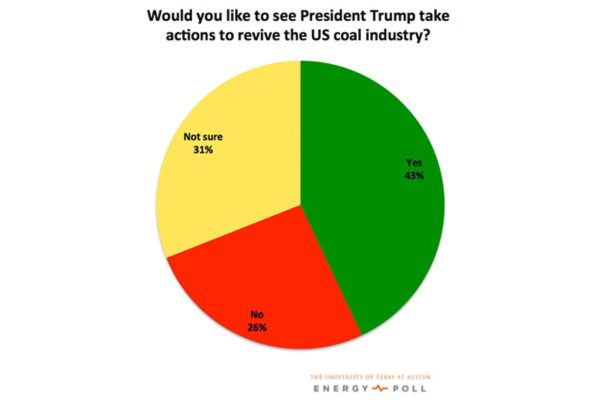AUSTIN, Texas — Nearly half of Americans (43 percent) want President Donald Trump to take actions to revive the struggling U.S. coal industry despite strong market signals that coal will continue to be displaced by cheaper and cleaner forms of energy, according to the latest UT Energy Poll.
Of the of survey respondents who support such actions by the president, 42 percent point to job creation as the top reason, 23 percent say coal is a necessary fuel source, and another 23 percent say a coal industry revival would hasten energy independence.
These findings reflect a disconnect between energy market conditions, which show a steady decline in the use of coal for electricity generation, and statements made by Trump, who has pledged to revitalize the coal industry and create coal-mining jobs.
The poll also reveals that 64 percent of Americans believe the president can have an impact on the future of the U.S. coal industry — up from 55 percent just six months ago. Most experts agree that current market conditions, namely an abundance of inexpensive natural gas and increasingly competitive forms of renewable energy, will prevail regardless of policy or regulatory changes.
Efforts to resuscitate the coal industry, such as a recent rollback of environmental regulations that would have imposed strict limits on carbon dioxide emissions, will not affect market trends and conditions, according to Michael Webber, deputy director of the UT Austin’s Energy Institute.
“Coal’s struggles are real and hard to mitigate,” Webber said. “It’s difficult to conceive how these market trends could be reversed, no matter how Trump tries to protect coal from competition.”
The latest wave of the UT Energy Poll surveyed 2,013 consumers on a wide range of energy issues, including climate change, energy expertise at top federal agencies and consumers’ clean energy choices.
“We’re seeing a marked change in attitudes on a variety of issues for the first time in years,” said Sheril Kirshenbaum, director of the UT Energy Poll. “For example, over the past six months, the percentage of Americans who say they are not concerned about carbon emissions has increased from 19 percent to 30 percent.”
The survey also reveals some striking differences among survey respondents’ views of the U.S. coal industry and other energy and environmental issues based on age and political party affiliation:
- Sixty-four percent of Republicans say they would like President Trump to take action to revive the coal industry, compared with just 32 percent of Democrats.
- Sixty-two percent of respondents under 35 years old say they would be more likely to vote for a presidential candidate who supports decreasing the use of coal as an energy source, compared with 33 percent of those 65 and older.
- Fifty-one percent of those in households earning $50,000 annually expressed concern about the decline of the U.S. coal industry, while just 42 percent earning less than $50,000 did.
Other highlights from the latest UT Energy Poll:
- The percentage of Americans who say climate change is “mostly due to natural forces” has increased from 5 percent to 20 percent during the past 12 months.
- Seventy-five percent of Americans say climate change is occurring, including 62 percent of Republicans and 87 percent of Democrats.
- One out of five respondents (20 percent) say U.S. energy policy will reduce their clean energy choices during the next five years, compared with 12 percent just six months ago.
- Less than half of Americans (44 percent) are familiar with the Keystone XL pipeline. Of those, 40 percent support the project and 31 percent oppose it.
- When asked whom they trust the most to act in their best interests on federal energy policy, 20 percent of survey respondents say nonprofit organizations; 15 percent say the president; and 8 percent say universities and academia.
For complete topline results, more charts and other information about the nationwide, online survey, visit www.utenergypoll.utexas.edu.
Data from The University of Texas at Austin Energy Poll were weighted using U.S. Census Bureau figures, as well as propensity scores, to ensure that the sample’s composition reflects the actual U.S. population. The online nationwide survey, conducted in March 2017, has a margin of error of 3.1 percentage points. The poll was developed by the McCombs School of Business and is supported by the KBH Center for Energy, Law & Business and the Energy Institute. The survey is intended to provide an objective, authoritative look at consumer attitudes and perspectives on key energy issues and is designed to help inform national discussion, business planning and policy development. This is the 12th wave of the Energy Poll.




